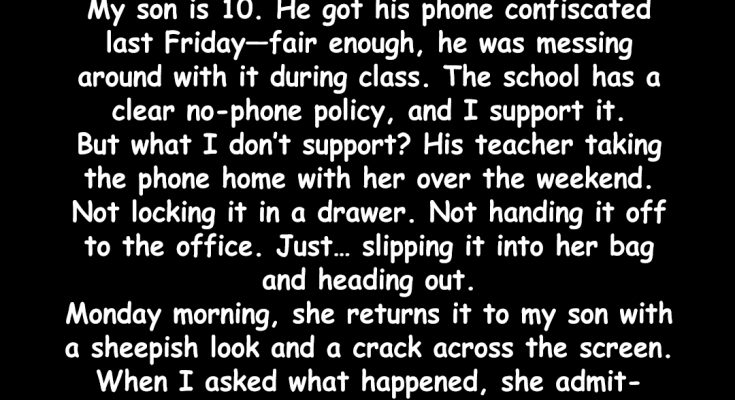She admitted she left it in her purse all weekend. Now the screen’s cracked and the school wants me to drop it.
My son is 10. He got his phone confiscated last Friday—fair enough, he was messing around with it during class. The school has a clear no-phone policy, and I support it.
But what I don’t support? His teacher taking the phone home with her over the weekend.
Not locking it in a drawer. Not handing it off to the office. Just… slipping it into her bag and heading out.
Monday morning, she returns it to my son with a sheepish look and a crack across the screen.
When I asked what happened, she admitted—admitted!—that she’d forgotten it was in her purse and it “might’ve gotten bumped” when she tossed it in the trunk.
No apology. No offer to fix it. Just said, “Well, maybe he shouldn’t have brought it to school in the first place.”
I reported her to the principal. She’s been at the school for years and is considered one of the “good ones,” but I don’t care.
Now other parents are texting me saying I “overreacted” and that I’m “ruining her career over a screen.”
But they don’t know what she said to me privately—
She pulled me aside after school, lowered her voice, and said, “You know, some parents just accept when their kids mess up. They don’t go around making trouble for everyone else.”
It wasn’t even about the phone anymore. It was how condescending she was—how sure she was that I’d back down just to keep things peaceful.
But I wasn’t going to back down. My son’s things matter. Teaching accountability matters.
And this wasn’t about punishing her—it was about making things right.
I asked the school to pay for the phone repair or replace it entirely. The principal said they’d “look into it.” That was code for “wait until I let it go.”
So I followed up every two days. Called, emailed, left voicemails. Polite but firm.
A week later, the principal finally called me in for a meeting.
She and the teacher were both there, sitting in that too-small office with the dusty bookshelf and the fake plant in the corner.
The teacher crossed her arms, clearly irritated. The principal gave me that rehearsed smile they give all parents when they want to seem “neutral.”
They said they’d reviewed the matter and decided it was “unfortunate,” but since the phone shouldn’t have been at school to begin with, they wouldn’t be covering the cost.
I nodded. Then I reached into my bag and pulled out a printout—an excerpt from the district policy handbook.
It clearly stated that any personal item confiscated by school personnel must be stored securely on campus. Nowhere did it say a teacher could take something home.
The principal’s smile tightened.
I also pointed out that the teacher had admitted—on more than one occasion—that she left the phone in her purse all weekend.
“I understand my son broke a rule,” I said, “and he’s been grounded for it. But what followed wasn’t a school rule. It was a personal choice that resulted in damage.”
The teacher still didn’t apologize. In fact, she said, “You act like this is a big deal. It’s just a screen. These kids drop their phones all the time.”
That’s when something in me snapped.
“It’s not just a screen,” I said. “It’s respect. And responsibility. And if you can’t model that for your students, what exactly are you teaching them?”
There was a long silence.
The principal cleared her throat and said she’d “reopen the discussion with the district’s legal team.”
That was a fancy way of stalling again. So I took a breath and added one more thing.
“I’ve already contacted the district office and shared the incident, the messages, and your responses. I wanted to give this school the chance to do the right thing. But if I don’t hear anything back in 48 hours, I’ll go public.”
The teacher’s face went pale.
I wasn’t bluffing. I had already drafted a post for the local parenting group and collected screenshots of everything—texts, policy quotes, even a voice memo of the teacher admitting she took the phone home.
Sure enough, within 24 hours, I got a call back from the school board rep.
They offered to cover the full cost of the screen replacement and “review internal policies on confiscated items.”
It should’ve ended there, but it didn’t.
Because a few days later, my son came home and said the teacher hadn’t called on him once during class. She’d skipped him during group activities, and when he asked a question, she waved him off.
I emailed the principal again. Told her I was worried about retaliation.
She claimed the teacher was just “feeling overwhelmed” and would “return to her usual self soon.”
I didn’t wait to find out.
I requested my son be transferred to another class.
It took some pushing, but we made it happen. His new teacher, Mrs. Wynn, was warm, structured, and actually seemed to like her job.
My son started participating again. His confidence bounced back.
And then, the twist I didn’t expect—
Another mom messaged me privately.
She said she’d heard about what happened and that her daughter had a similar story the year before—different item, same teacher. A smartwatch confiscated, taken home, returned with a dead battery and a scratched face. She’d dropped it, apparently.
No apology that time either.
But that mom hadn’t spoken up because, like me, she was afraid of being “that parent.”
Then another message came in.
And another.
Turns out, there were five parents with similar stories. Some had given up. Others had quietly withdrawn their kids from that class.
I told them I was happy to pass along the district contact info if they wanted to file a joint complaint.
Three of them did.
A month later, the teacher was placed on leave.
That wasn’t what I wanted at first. I just wanted her to take responsibility and treat kids’ things with care.
But after hearing what she’d said and done to others, it was clear—this wasn’t a one-time mistake. It was a pattern.
My son learned something through all of this. He learned that yes, rules matter—but so does standing up when someone crosses a line.
He learned that adults don’t always get it right—but that doesn’t mean we stay silent.
And I learned something too.
I learned that speaking up—even when others say you’re overreacting—isn’t about being dramatic. It’s about setting a boundary. About showing your child that they deserve to be respected, no matter their age.
The school quietly brought in a new teacher to replace the one on leave. She eventually “resigned for personal reasons.”
I didn’t dance on her professional grave.
But I did take my son out for ice cream and told him, “You were right to tell me what happened. And I’m proud of you for speaking up.”
He smiled and said, “Does this mean I can get the phone back?”
I laughed. “Nice try. But you’re still grounded for using it in class.”
He groaned, but he knew I was teasing. Mostly.
Looking back, I’m glad I didn’t back down.
It wasn’t just about the phone.
It was about fairness. About teaching my son that his voice matters. That when someone wrongs you, it’s okay to expect accountability—even from someone in charge.
So to any parent reading this, wondering if they should speak up?
Do it.
Not because you’re trying to cause trouble, but because staying silent only helps the people who already have power.
And sometimes, the quiet ones? The so-called “troublemakers”? They’re the reason change even happens.
Have you ever had to stand up for your kid when everyone else told you to let it go? Share your story below—and if this one hit home, give it a like so more people can see it.

